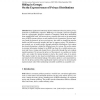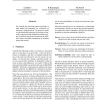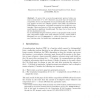27 search results - page 4 / 6 » Sequential Rationality in Cryptographic Protocols |
SEC
2008
13 years 8 months ago
2008
Many applications inherently disclose information because perfect privacy protection is prohibitively expensive. RFID tags, for example, cannot be equipped with the cryptographic p...
TARK
2007
Springer
14 years 1 months ago
2007
Springer
We contend that reasoning about knowledge is both natural and pragmatic for verification of electronic voting protocols. We present a model in which desirable properties of elect...
EUROCRYPT
2009
Springer
14 years 8 months ago
2009
Springer
The notion of Zero Knowledge Proofs (of knowledge) [ZKP] is central to cryptography; it provides a set of security properties that proved indispensable in concrete protocol design...
EUROCRYPT
2006
Springer
13 years 11 months ago
2006
Springer
To prove that a secure key-agreement protocol exists one must at least show P = NP. Moreover any proof that the sequential composition of two non-adaptively secure pseudorandom fun...
PKC
1999
Springer
13 years 11 months ago
1999
Springer
With the development of high speed computer networks, video service on the Web has huge market potential in that the video service can be provided to subscribers with greater time ...




